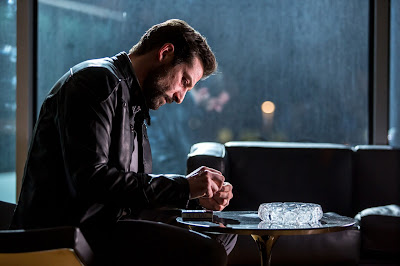Don't know how I happened to miss SHANGHAI TRIAD when it was released theatrically in the USA during the turn-of-the year holiday season of 1995-96. Chinese filmmaker Zhang Yimou and his star Gong Li were at the height of their critical and arthouse/ mainstream success around then, and the film itself -- a beautiful and quite dark costume/ gangster melodrama set in Shanghai in the 1930s -- holds up exceedingly well.
In any case, it's great to be able to catch up with the film in its new and very fine Blu-ray transfer from Film Movement. Visually, this is one of the more beautiful movies you're likely to encounter, even if you will wonder if and why Zhang (shown at left) decided not (or simply neglected) to bother with any day-for-night effects. Nighttime has never looked this bright or sunny.
The initially-simple-but-soon-grows-more-complicated story involves an adolescent Tang family member (Wang Xiaoxiao, below, right) from the provinces who has come to Shanghai to work for the boss of an upper-echelon crime family, more specifically for that boss' spoiled and nasty showgirl mistress (played by Ms Gong, below, left).
Betrayals of many types soon follow, and characters (some of them, at least) grow and change. By the end of this breathtakingly gorgeous and quite dark movie, the lessons learned have come at a huge cost. If Shanghai Triad does not have the obvious political and emotional heft of To Live, nor the historical/political/feminist framework of something like Raise the Red Lantern, all of these things remain essential to the film nonetheless. They may seem buried under the melodrama, but in a sense this makes them register all the more oddly yet strongly
There is only a single Bonus Features on the disc, but it's a whopping good one: a video essay by Grady Hendrix entitled "Trouble in Shanghai" that goes to town on all the ways one can view Shanghai Triad -- including as a kind of unintentional biopic/biography of both Zhang and Gong and the filmmaking process itself. This is a witty, funny, hugely intelligent piece of criticism/provocation, but do wait until you've seen the film to watch and listen to it.
From Film Movement Classics, in Mandarin with English subtitles and running 108 minutes, the film makes its Blu-ray debut this Tuesday, August 4 -- for purchase (and eventually, I would hope, for rental, too).





















































